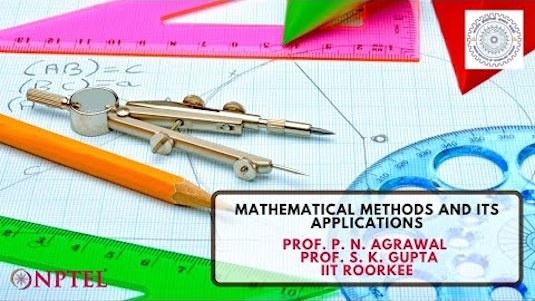
Moocable is learner-supported. When you buy through links on our site, we may earn an affiliate commission.
Description
In a sense, differential calculus is local: it focuses on aspects of a function near a given point, like its rate of change there. Integral calculus complements this by taking a more complete view of a function throughout part or all of its domain.
This course provides complete coverage of the two essential pillars of integral calculus: integrals and infinite series. By the end, you'll know their core principles and how to apply them to problems in geometry, probability, and physics.
Tags
Syllabus
- Introduction: The core of integral calculus.
- Calculating Distance: Find your way to Riemann sums through a simple motion problem.
- Using Riemann Sums: See how Riemann sums crop up in many different places.
- The Definite Integral: Leverage your understanding of Riemann sums to master the basic ideas of integration.
- Integration Techniques: The essential toolkit, from the fundamental theorem to substitutions.
- First Calculations: Make the connection between limits, Riemann sums, and definite integrals.
- The Fundamental Theorem of Calculus: Solidify your complete comprehension of the close connection between derivatives and integrals.
- Integrating Polynomials: Begin to unravel basic integrals with antiderivatives.
- Substitution: Reverse the chain rule to compute challenging integrals.
- Exponentials and Trig: Dabble with transcendental integrals.
- Advanced Integration: A medley of integration techniques that no professional can do without.
- Integration by Parts: Combine derivative rules to reshape a definite integral into something simpler.
- Basics of Partial Fractions: Learn to break rational integrals down into simpler parts.
- Trigonometric Integrals: Simplify tricky trig integrals with Euler's formula.
- Trig Substitution: Uncover powerful integrals through trigonometry.
- Integration in the World: Look at how integrals are really done in practice.
- Integral Applications: Use integrals to solve crucial problems in math and science.
- Area and Probability: Dive into some real-world applications of integrals.
- Calculating Volume: Construct volume integrals for a variety of 3D objects using disks, washers, and shells.
- Arc Length and Surface Area: Apply integrals to geometry and explore the paradoxical shape of Gabriel's Horn.
- Integration in Physics I: Go beyond geometry and put integrals to work in physics problems.
- Application: Differential Equations: Apply partial fractions to important real-world problems.
- Integration in Physics II: Bring all integral methods to bear on a crucial physics problem.
- The Idea of Infinite Sums: The fundamental concepts of sums without end.
- Zeno's Paradox & Sums: Learn about infinite series through a legendary footrace.
- Sums and Sigma Notation: Master the language of sums both finite and infinite.
- Secret Identities: Expose familiar functions as infinite sums in disguise.
- Infinite Series: Convergence tests for infinite sums and their applications.
- Converging Sums: What does it mean for a sum to converge?
- Ratio and Root Tests: Exploit the geometric sum to create brand new convergence tests.
- The Integral Test: Connect infinite sums to integrals through geometry.
- Rearrangements: 0=1?: Explore the strange properties of sums that don't converge absolutely.
- Limit Comparison Test: Expand the menagerie of convergence tests and create a new fundamental number in the process.
- Power Series: Practice with infinite sums at the heart of many real-world applications.
- Basics of Fourier Series: Step into the world of infinite sums of sines and cosines.

-
TypeOnline Courses
-
ProviderBrilliant
In a sense, differential calculus is local: it focuses on aspects of a function near a given point, like its rate of change there. Integral calculus complements this by taking a more complete view of a function throughout part or all of its domain.
This course provides complete coverage of the two essential pillars of integral calculus: integrals and infinite series. By the end, you'll know their core principles and how to apply them to problems in geometry, probability, and physics.
This course provides complete coverage of the two essential pillars of integral calculus: integrals and infinite series. By the end, you'll know their core principles and how to apply them to problems in geometry, probability, and physics.
- Introduction: The core of integral calculus.
- Calculating Distance: Find your way to Riemann sums through a simple motion problem.
- Using Riemann Sums: See how Riemann sums crop up in many different places.
- The Definite Integral: Leverage your understanding of Riemann sums to master the basic ideas of integration.
- Integration Techniques: The essential toolkit, from the fundamental theorem to substitutions.
- First Calculations: Make the connection between limits, Riemann sums, and definite integrals.
- The Fundamental Theorem of Calculus: Solidify your complete comprehension of the close connection between derivatives and integrals.
- Integrating Polynomials: Begin to unravel basic integrals with antiderivatives.
- Substitution: Reverse the chain rule to compute challenging integrals.
- Exponentials and Trig: Dabble with transcendental integrals.
- Advanced Integration: A medley of integration techniques that no professional can do without.
- Integration by Parts: Combine derivative rules to reshape a definite integral into something simpler.
- Basics of Partial Fractions: Learn to break rational integrals down into simpler parts.
- Trigonometric Integrals: Simplify tricky trig integrals with Euler's formula.
- Trig Substitution: Uncover powerful integrals through trigonometry.
- Integration in the World: Look at how integrals are really done in practice.
- Integral Applications: Use integrals to solve crucial problems in math and science.
- Area and Probability: Dive into some real-world applications of integrals.
- Calculating Volume: Construct volume integrals for a variety of 3D objects using disks, washers, and shells.
- Arc Length and Surface Area: Apply integrals to geometry and explore the paradoxical shape of Gabriel's Horn.
- Integration in Physics I: Go beyond geometry and put integrals to work in physics problems.
- Application: Differential Equations: Apply partial fractions to important real-world problems.
- Integration in Physics II: Bring all integral methods to bear on a crucial physics problem.
- The Idea of Infinite Sums: The fundamental concepts of sums without end.
- Zeno's Paradox & Sums: Learn about infinite series through a legendary footrace.
- Sums and Sigma Notation: Master the language of sums both finite and infinite.
- Secret Identities: Expose familiar functions as infinite sums in disguise.
- Infinite Series: Convergence tests for infinite sums and their applications.
- Converging Sums: What does it mean for a sum to converge?
- Ratio and Root Tests: Exploit the geometric sum to create brand new convergence tests.
- The Integral Test: Connect infinite sums to integrals through geometry.
- Rearrangements: 0=1?: Explore the strange properties of sums that don't converge absolutely.
- Limit Comparison Test: Expand the menagerie of convergence tests and create a new fundamental number in the process.
- Power Series: Practice with infinite sums at the heart of many real-world applications.
- Basics of Fourier Series: Step into the world of infinite sums of sines and cosines.
Tags
Related Courses


STAT 507: Epidemiological Research Methods

Precalculus: Relations and Functions

Mathematical Methods And Its Applications

Group Theory methods in Physics

Joy of Problem Solving

C# and Shader Tutorials for the Unity Engine

Logic II

Praxis Fundamental Subjects: Content Knowledge (5511) Prep

FTCE General Knowledge Test (GK) (082) Prep

Geometry for Kids

CAHSEE Math Exam: Tutoring Solution
Loading...
Saving...
Loading...

 Online Courses
Online Courses  Brilliant
Brilliant
